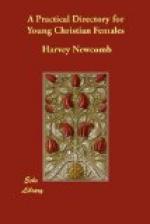(2.) How proved from the Scriptures. First, by direct declarations. Exod. 34:6, l.c. Ps. 117:2. 146:6, l.c. Second, by the accordance of the histories recorded in Scripture with the facts substantiated by other evidence. Third, by the predictions of events which have since been fulfilled. Fourth, from the doctrines contained in his Word. Fifth, by the agreement of Scripture with itself. Sixth, by the fulfilment of promises, threatenings, covenants, &c., recorded in his Word. Seventh, other proofs, as they may be suggested to the mind.
Practical Reflections. (1.) How God is qualified by this attribute to be the moral governor of intelligent creatures. (2.) How necessary is faith to acceptance with God. Heb. 11:6. (3.) How odious to a God of infinite veracity must be the sin of unbelief. 1 John 5:10. (4.) How terrible to the wicked this renders the threatenings of God’s word. (5.) How valuable his promises to the righteous. (6.) At what an infinite expense God has sustained his truth, while pardoning rebels doomed to die. Ps. 85:10. Rom. 3:26.
8. The Mercy of God. (1.) What mercy is. (2.) Contemplate mercy as a disposition inherent in the Divine character. (3.) The only way in which mercy can be exercised by Him, towards those who have merited anger and punishment, consistent with the moral rectitude of his character, and the great ends of his government. Ps. 85:10. Isa. 53:5, 6, 10. Acts 4:12. 5:31. Rom. 3:25, 26. (4.) How this attribute is manifested in his providence. Matt. 5:45. (5.) How in his Word. Neh. 9:17. Ps. 3:8. Matt. 5:7. Rom. 5:6. (These two may embrace several subdivisions.) (6.) Consider whether by the light of nature we could discover any possible way for God to exercise mercy towards the guilty.
Practical Reflections. (1.) The loveliness and glory of this attribute. (2.) How we should feel in view of it. Ps. 118. (3.) The great guilt and danger of indulging an unmerciful or cruel disposition. Prov. 11:17, l.c. 21:13. Mark 11:26. Jas. 2:13. (4.) The advantage of being merciful. Ps. 18:25. Prov. 11:17, f.c. Matt. 5:7. Mark 11:25.
9. The Wisdom of God. (1.) What wisdom is. How it differs from knowledge. How from cunning or subtilty. Whether that is wisdom which does not design to accomplish a good end. Whether this is a natural or moral attribute, or both. (2.) How the wisdom of God is manifested in the works of creation. Ps. 104. Prov. 3:19. Examine particular objects and see how exactly everything is fitted for the end for which it is designed, and that a good end; such as the seasons; day and night; provision made for the wants and for the comfort and pleasure of men and animals; the body and mind of man; the laws which govern the material world, carried put in a great variety of ways; in the infinite variety, and yet extensive and convenient classification, of objects; human languages; moral agency of intelligent beings, &c. (3.) The wisdom of God, as exhibited in his Word; First, its perfect adaptation to the wants of the world; its variety of authorship, style, matter, manner, &c.; Second, the truths revealed; particularly the plan of redemption. Rom. 11:33.




